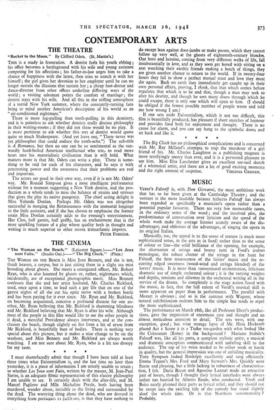CONTEMPORARY ARTS
THE THEATRE
"Rocket to the Moon." By Clifford Odets. (St. Martin's.) Tans is a study in frustration. A dentist feels his youth ebbing ; his office becomes a battleground with his wife and young assistant competing for his affections ; his father-in-law urges him to take a chance of happiness with the latter, then tries to snatch it with her himself ; the girl gives her devotion to her employer until he can no longer sustain the illusions that sustain her ; a cheap foot-doctor and dance-director from other offices underline differing ways of the world ; a visiting salesman points the comfort of marriage ; the dentist stays with his wife. And all this in the stiffing atmosphere of a torrid New York summer, where the constantly-turning fans bring to mind another American's description of his world as an "air-conditioned nightmare."
There is more leg-pulling than tooth-pulling in this dentistry, and it is pointless to ask whether dentists really discuss philosophy in their waiting-rooms ; if they did not there would be no play. It is more pertinent to ask whether this sort of dentist would quote quite so much Shakespeare. (And yet leave out, "There never was yet philosopher that could endure the tooth-ache.") The sub-title is A Romance, but then no one can be so sentimental as the out-, wardly hard-boiled American intellectual who trie., to read more heart into his materialistic civilisation than it will hold. What matters more is that Mr. Odets can write a play. There is some- thing to be said for each of his characters and he says it with penetrating power and the awareness that their problems are real and important.
The actors are good in their own way, even if it is not Mr. Odets' way. Mr. Ronald Simpson gives a most intelligent performance without for a moment suggesting a New York dentist, and the pro- duction as a whole tends to miss the balance of strains and stresses that gives the play its native pungency. The chief acting delight is Miss Yolande Donlan. Perhaps Mr. Odets was not altogether successful in merging the flirtatiousness with the immortal longings in the little assistant, and if she has chosen to emphasise the former strain Miss Donlan certainly adds to the evening's entertainment. Her Cleo, half gamin, half gadfly, has an enchantment that is the most sparkling feature of a play whose quality both in thought and writing is much superior to other recent transatlantic imports.
PETER FORSTER.


































 Previous page
Previous page